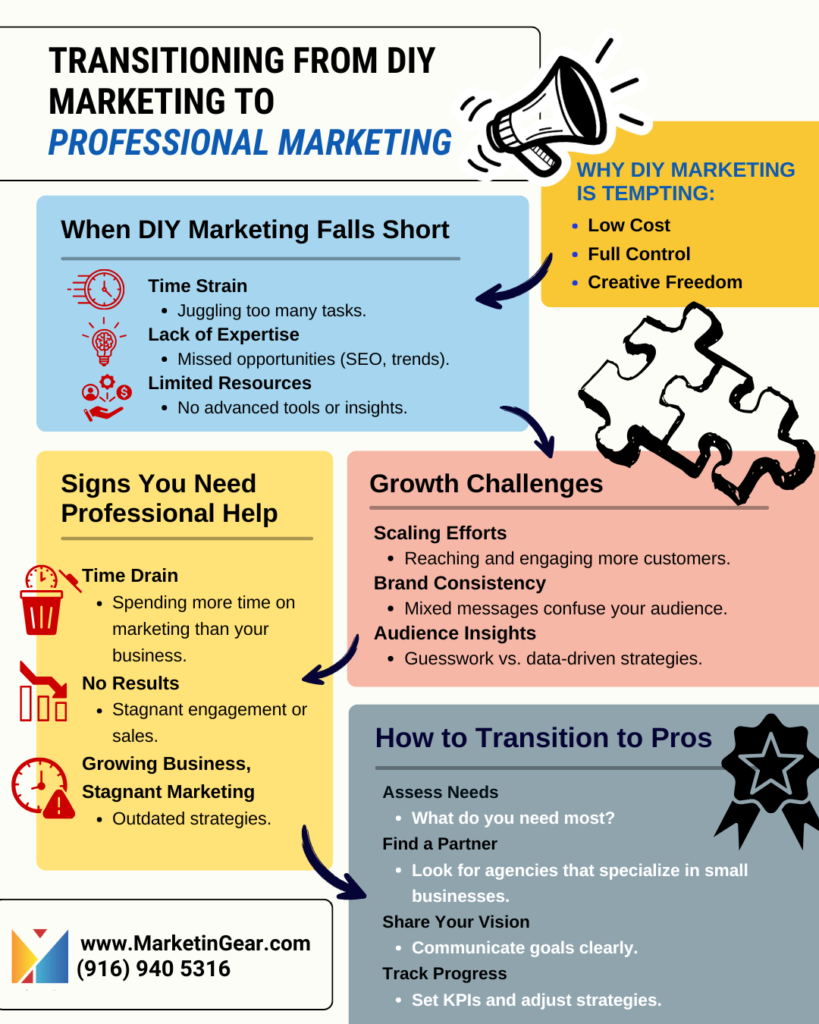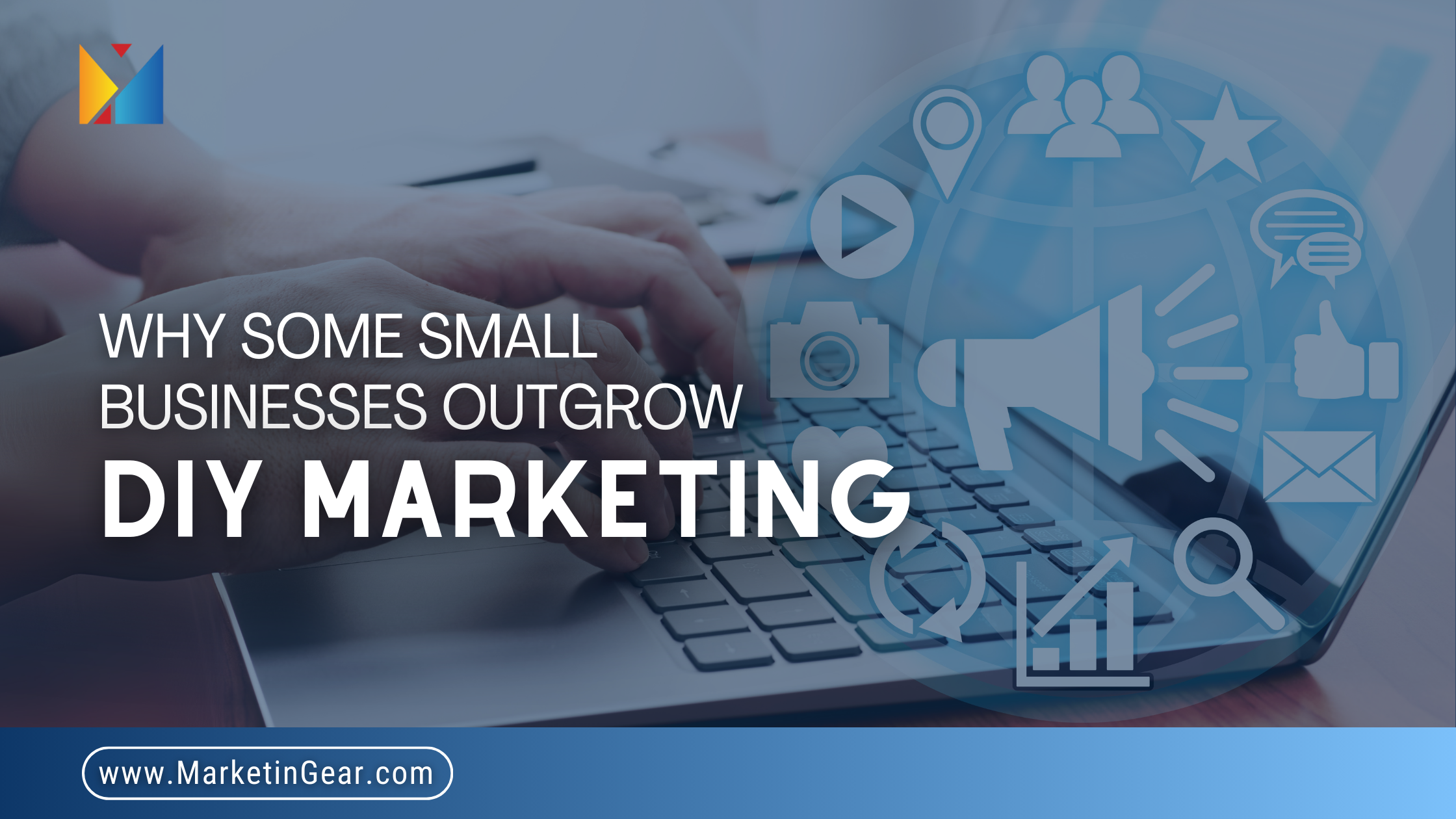Introduction
In the bustling world of small business, every entrepreneur starts with a dream, a unique idea, and a vision to share their passion with the world. Many begin their journey with DIY marketing, believing they can juggle everything from social media posts to email newsletters. It feels empowering to take charge, and the initial thrill of crafting your marketing messages can be incredibly rewarding. But as businesses grow, so do their challenges. The excitement of launching your own marketing campaigns can quickly turn into overwhelm, leading to frustration and burnout. At some point, you might find yourself asking, “Is outgrowing DIY marketing enough?” Let’s explore why some small businesses outgrow their DIY marketing strategies and when it’s time to consider professional help.

The Allure of DIY Marketing
Many small businesses opt for DIY marketing because it’s cost-effective and allows for complete control. You can create your own website, design your promotional materials, and manage your social media accounts without hiring anyone. It gives you the freedom to experiment and adjust strategies based on what feels right for your brand. However, as the saying goes, “What got you here won’t get you there.” As your business grows, so do the complexities of your marketing efforts, and the DIY approach may start to show its cracks.
The Limits of DIY Marketing
1. Time Constraints
As a small business owner, you wear many hats. You’re not just a marketer; you’re also a sales rep, customer service agent, and accountant. Unfortunately, this means that marketing often takes a backseat. You might find yourself saying, “I’ll get to that later,” only to realize that your marketing efforts are stagnating. Imagine a scenario where you’re constantly juggling tasks—responding to customer inquiries, managing inventory, and trying to create engaging social media posts. This constant hustle can leave little room for creativity or strategic thinking, resulting in missed opportunities to connect with your audience.
2. Lack of Expertise
While you might be great at running your business, marketing is a different beast. Trends change rapidly, and what worked last year might not work today. When you’re trying to handle everything on your own, you might miss crucial strategies that could elevate your brand. Remember, “You don’t know what you don’t know.” For instance, understanding SEO and how it impacts your online visibility is essential. If you’re not familiar with these concepts, you might overlook basic optimization techniques, leading to less traffic and fewer conversions.
3. Limited Resources
DIY marketing usually means limited resources—both in terms of budget and tools. You might be using free tools that don’t give you the analytics you need to understand your audience. Think about it: if you’re throwing darts blindfolded, how can you hit the target? Additionally, limited access to advanced marketing tools means you might miss out on valuable insights that can help tailor your strategies to meet your audience’s needs.
Growth Challenges in DIY Marketing
As businesses grow, they often face unique challenges that can’t be tackled with DIY marketing alone.
1. Scaling Your Efforts
Once your business starts gaining traction, your marketing needs to scale, too. This means increasing your reach, engaging more customers, and tracking your efforts effectively. It’s not just about posting on social media; you need a cohesive strategy that encompasses various channels. For example, if you’re gaining more followers on social media, you need to have a plan for converting those followers into customers. A professional marketing team can help develop a strategy that integrates your online presence with your sales goals.
2. Branding Consistency
Your brand is your voice, and it’s essential to keep it consistent across all platforms. A patchwork of DIY efforts can lead to mixed messages that confuse your audience. For instance, if your Instagram posts are light and playful while your email campaigns are formal and serious, customers might not know what to expect from your brand. Consistency builds trust, and as your business grows, so does the need for a unified brand message that resonates with your audience.
3. Audience Insights
As you scale, understanding your audience becomes even more critical. Professional marketing can provide data-driven insights that help you tailor your strategies effectively. With DIY marketing, you might rely on guesswork, but that won’t cut it as your business expands. Consider the example of a small business that starts collecting customer feedback through surveys or social media engagement. With professional tools, they can analyze this data to understand trends, preferences, and behaviors, allowing for more targeted marketing efforts.
When to Outsource Marketing for Small Businesses
Recognizing the signs that it’s time to transition from DIY marketing to professional services can be a game-changer. Here are a few indicators:
1. You’re Spending More Time on Marketing Than Running Your Business
If you find yourself spending late nights on marketing tasks rather than focusing on your core business operations, it’s time to reconsider your approach. You started your business to pursue your passion, not to be overwhelmed by marketing challenges. This misalignment can lead to burnout and reduce your overall effectiveness as a business owner.
2. You’re Not Seeing Results
If your DIY efforts aren’t yielding results—such as increased website traffic, engagement, or sales—it’s a red flag. Professional marketers bring experience and knowledge that can turn your marketing strategy around. For instance, if you’ve been posting regularly on social media without any increase in followers or engagement, it may be time to seek guidance from professionals who can refine your strategy.
3. Your Business Is Growing, but Your Marketing Isn’t
If your business is expanding but your marketing strategies remain stagnant, you might miss out on significant opportunities. Professional marketing agencies can provide fresh ideas and innovative strategies to keep up with your growth. Imagine launching a new product line; having an experienced marketing team can help you create a buzz and ensure a successful launch.
Transitioning to Professional Marketing
Once you’ve recognized that it’s time to make the shift, how do you go about transitioning to professional marketing? Here are some actionable steps:
1. Assess Your Needs
Start by evaluating what areas of marketing you need the most help with. Is it social media management, SEO, content creation, or a combination? Understanding your needs will help you find the right agency. This assessment could involve looking at your current marketing performance and identifying gaps that require attention.
2. Research Potential Partners
Look for marketing agencies that specialize in small businesses. Read reviews, check their portfolio, and see if their values align with yours. A good partnership is built on mutual understanding and shared goals. Don’t hesitate to reach out for consultations to get a feel for their approach and how they can address your specific challenges.
3. Communicate Your Vision
Once you’ve selected an agency, communicate your business goals, target audience, and vision clearly. The more information they have, the better they can craft strategies tailored to your needs. This collaboration will ensure that everyone is on the same page and working toward common objectives.
4. Monitor Progress
After outsourcing, keep an eye on your marketing efforts. Regular check-ins will ensure that you’re on the right track and that your marketing strategies align with your business objectives. Establish key performance indicators (KPIs) to measure success and adjust strategies as needed.
Conclusion
Outgrowing DIY marketing is a natural progression for many small businesses. While it may seem daunting to transition to professional marketing, doing so can open doors to new opportunities and growth. Remember, you don’t have to navigate this journey alone. With the right marketing partner, you can focus on what you do best—running your business—and let the experts handle the rest.
Are you ready to take your marketing to the next level? Contact MarketinGear today, and let’s work together to build a robust marketing strategy that drives your business forward!




